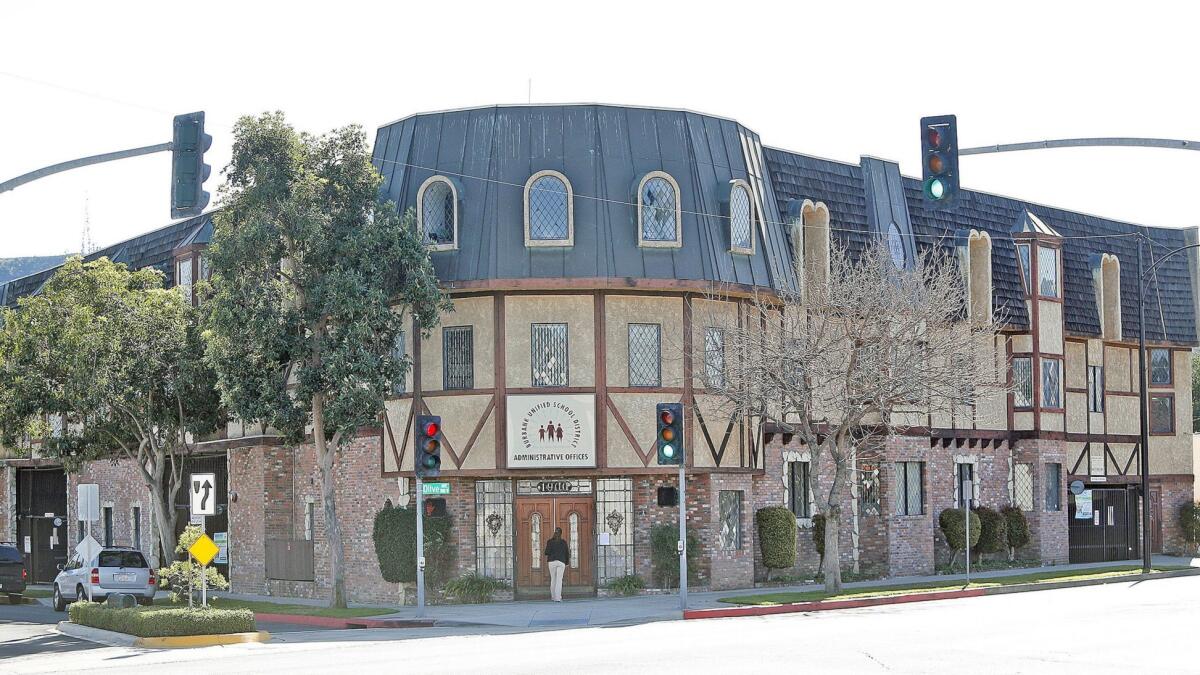Burbank Unified’s future vision includes global perspective, adaptation

- Share via
BURBANK — A future highlighted by a dual-language program described as multifaceted and adaptive to change, while grounded in fundamentals for Burbank Unified students, was discussed as a way to look at how the district will function in the year 2032 during a board retreat and working meeting Saturday.
The point of the “Vision 2032” discussion, part of a longer, six-hour get-together, which included about 30 members of the public, was to consider what the district’s future might look like.
“Today, we take a step up and say, ‘let’s imagine what a graduate of 2032 would look like?’” Burbank Unified Supt. Matt Hill said during the meeting.
The discussion was meant to build on other board goals and priorities for the future, such as the district’s Local Control Accountability Plan or LCAP.
The LCAP draft for next year lists nine goals, such as “improve student learning and achievement for target subgroups of students,” otherwise known as goal No. 1, and goal No. 2, “improve student learning and achievement for all students.”
While the LCAP plan dives into costs and methodology for implementing those proposals, “Vision 2032” takes a look further down the line.
“It’s not just focused on the here and now, with limited resources,” Hill said. “We can set specific goals, sure, but what I liked about this conversation is that it wasn’t about getting kids ready for specific jobs but rather what skills do we want our kids to graduate with.”
Hill said he worked with district principals to develop a vision that included instructional goals, such as “our teaching is culturally responsive,” while one graduation aspiration for students was “having learned how to effectively use technology and how to be good digital citizens.”
Armond Aghakhanian, the local school board’s vice president and East Los Angeles College’s chief development officer, said he thinks Burbank Unified needs to look at issues internationally.
“I can tell you one of the challenges and, you see it with [ELAC] students, is they’re not ready to go into global markets, meaning it’s not speaking the language and not understanding how business is conducted,” Aghakhanian said.
“Our schools need to become learning organizations, like, you look at a lot of companies today, like the Apples, where within the structure itself, not only does the organization learn from its employees but also from the community,” he added.
Board member Steve Ferguson pointed to a global arena in which students are already competing with peers from many countries — China, in particular.
“We’re teaching Spanish, which is one step, but what about Chinese?” Ferguson asked.
Ferguson, who said he “couldn’t have imagined” working remotely 10 years ago, noted that teaching and learning should be more open.
“We see that students do better in different models, working in their own way,” Ferguson said. “Why can’t we proactively offer that model for students as a means to accomplish that education when that may be one of the barriers experienced in their day-to-day life?”
Board member Charlene Tabet spoke of breaking down goals and visions separately for elementary, middle school and high school students.
“Our focus really needs to be open and accepting of all learners, but really get them their basics, while learning to think individually,” Tabet said of elementary-school education.
“We spend so much time later on trying to catch kids up. Let’s focus on elementary and really get their basics sound,” she added.
Board member Steve Frintner said he thinks the district’s best resources should be made available to everyone.
“Within the district, within the last few years, we’ve actually had innovative ideas and certain schools have had a chance to take certain opportunities and act on them,” Frintner said.
He added, “It shouldn’t just be at one school that can afford [them] through their booster club to support it ... It should benefit students at all schools.”
Board president Roberta Reynolds, a pharmacist manager at Hollywood Presbyterian Medical Center, said she’s seen the consequences of students not being prepared to adapt at her job, which is undergoing several changes, including automation.
“What I am watching over the last three months is the staff coming to grips with what is happening here and coming to grips with the fact that [this] is a natural outcome of technology,” Reynolds said.
“I came out of school knowing that this was going to be the case and having to fight for every innovation and every way in which I was valuable,” she added.
Hill said that, while funding challenges are an issue for Burbank Unified, which recently closed a $3.5-million deficit, there is value in looking into the future.
“This is a guide for us, a north star,” he said. “If we want to do these big, bold things, we as a community will have to decide how we’re going to fund it, whether that’s locally, through partnerships or even a parcel tax. We have to have an idea of what we’re going to be funding.”
